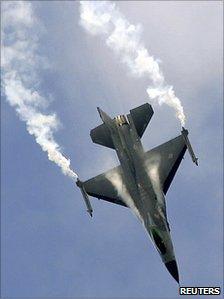US defence firm Lockheed Martin hit by cyber-attack
- Published

Lockheed Martin makes F-16 fighter jets
US defence firm Lockheed Martin says it has come under a significant cyber-attack, which took place last week.
Few details were available, but Lockheed said its security team had detected the threat quickly and ensured that none of its programmes had been compromised.
The Pentagon said it is working to establish the extent of the breach.
Lockheed makes fighter jets, warships and multi-billion dollar weapons systems sold worldwide.
Lt Col April Cunningham, speaking for the US defence department, said the impact on the Pentagon was "minimal and we don't expect any adverse effect".
Lockheed Martin said in a statement, external that it detected the attack on 21 May "almost immediately" and took counter-measures.
As a result, the company said, "our systems remain secure; no customer, program or employee personal data has been compromised".
However, it is still working to restore employee access several days after the attack.
Offshore attacks
Lockheed Martin is the world's biggest aerospace company and makes F-16, F-22 and F-35 fighter jets as well as warships.
Four years ago, the firm apparently tightened security after officials revealed hackers had breached Lockheed's high-tech Joint Fighter programme.
Josh Shaul, chief technology officer at New York-based database security company Application Security, said other defence contractors will now be assessing their own measures.
"I guarantee you every major defence contractor is on double alert this weekend, watching what's going on and making sure they're not the next to fall victim."
In Australia, too, the government has warned companies to be extra vigilant of offshore cyber attacks.
The advice comes after the outgoing head of the country's biggest oil and gas company said attacks were coming "from everywhere".
"It comes from eastern Europe; it comes from Russia. Just don't pick on the Chinese; it's everywhere," Don Voelte, chief executive of Woodside Petroleum was quoted as saying.
Australian Attorney-General Robert McClelland singled out resource companies as being targeted.
"There is no doubt that cyber-security threats are becoming worse," he told Reuters.
"Without talking about specific incidents, there have been a number of reports concerning our resource companies."
- Published26 May 2011
- Published19 April 2011
- Published10 February 2011
- Published30 December 2010
- Published4 February 2011